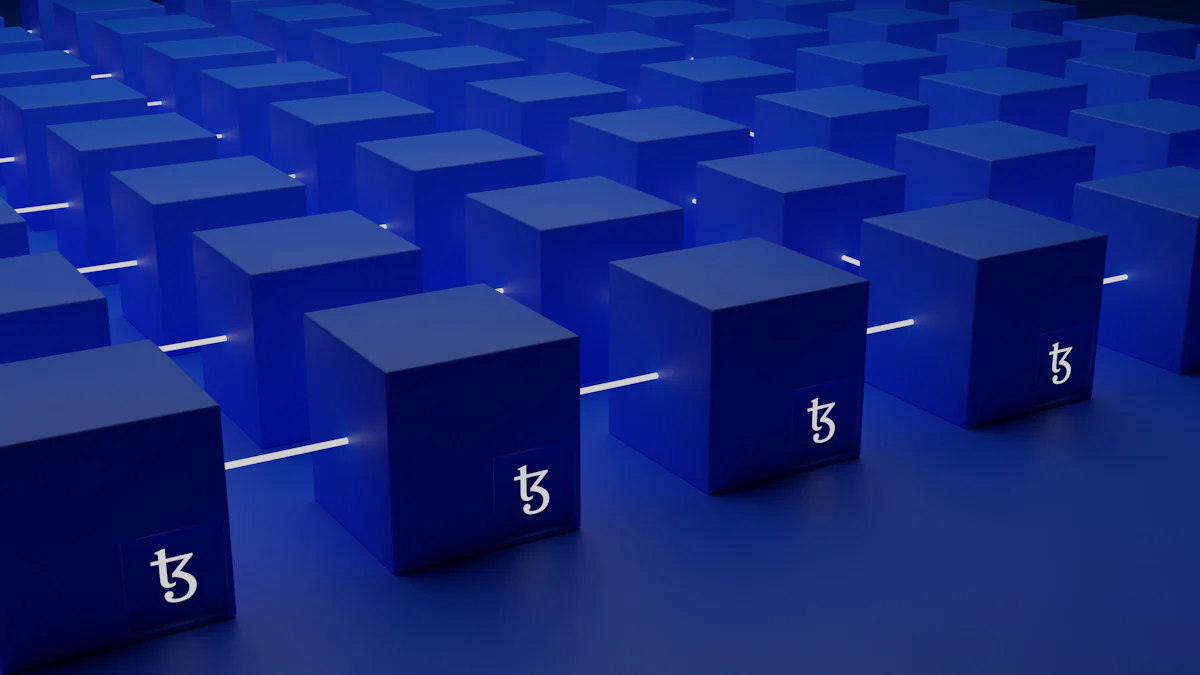How Microsoft is Integrating Blockchain into Cloud Solutions

Microsoft stands as a titan in the realm of cloud computing, offering robust solutions that empower businesses worldwide. You might wonder how blockchain technology fits into this picture. Blockchain, known for its decentralization and security, extends beyond finance, impacting sectors like healthcare and logistics. Its potential to replace digital platforms is noteworthy. Microsoft integrating blockchain into its cloud solutions enhances data security and transparency. This integration allows you to leverage blockchain's benefits, ensuring a more efficient and tamper-proof digital environment.
Understanding Blockchain Technology
Definition and Core Principles
Blockchain technology is a revolutionary system that transforms how data is stored and shared. At its core, blockchain operates on two main principles: decentralization and transparency.
Decentralization
In traditional systems, a central authority, like a bank, manages transactions. Blockchain changes this by using a distributed network of computers. This setup eliminates the need for third parties, reducing censorship and control. You gain more freedom and fairness in transactions, as no single entity holds power over the network.
Transparency and Immutability
Blockchain ensures that once data enters the system, it cannot be altered. This immutability guarantees that records remain trustworthy. Transparency allows you to view all transactions on the network, fostering trust and accountability. These features make blockchain a reliable choice for secure data management.
Types of Blockchain
Blockchain comes in various forms, each serving different needs. Understanding these types helps you choose the right one for your requirements.
Public Blockchain
Public blockchains are open to everyone. Anyone can join and participate in the network. This type offers high transparency and security, making it ideal for applications where trust is crucial. Bitcoin is a well-known example of a public blockchain.
Private Blockchain
Private blockchains restrict access to specific users. They offer more control and privacy, suitable for businesses needing secure internal operations. You can manage permissions and ensure that only authorized individuals access sensitive information.
Consortium Blockchain
Consortium blockchains blend features of both public and private types. A group of organizations governs them, allowing collaboration while maintaining some level of privacy. This type is perfect for industries like finance, where multiple parties need to work together securely.
By understanding these aspects of blockchain technology, you can better appreciate its potential and decide how to integrate it into your cloud solutions.
Overview of Cloud Computing
Definition and Core Principles
Cloud computing revolutionizes how you access and manage resources. It provides a flexible and efficient way to handle data and applications over the internet. Let's explore its core principles.
On-demand Resource Availability
Cloud computing offers resources whenever you need them. You can access computing power, storage, and applications without waiting. This on-demand availability ensures that you only pay for what you use, making it cost-effective and efficient.
Scalability and Flexibility
Scalability is a key feature of cloud computing. You can easily increase or decrease resources based on your needs. This flexibility allows you to adapt quickly to changes in demand, ensuring optimal performance and cost management.
Types of Cloud Computing
Understanding the different types of cloud computing helps you choose the right solution for your needs. Each type offers unique benefits and caters to specific requirements.
Infrastructure as a Service (IaaS)
Infrastructure as a Service (IaaS) provides virtualized computing resources over the internet. You can rent servers, storage, and networking components. This model gives you control over the infrastructure while reducing the need for physical hardware.
Platform as a Service (PaaS)
Platform as a Service (PaaS) offers a platform for developing, testing, and deploying applications. You focus on building your application, while the provider manages the underlying infrastructure. This approach speeds up development and reduces complexity.
Software as a Service (SaaS)
Software as a Service (SaaS) delivers software applications over the internet. You access these applications through a web browser, eliminating the need for installation or maintenance. SaaS provides convenience and accessibility, making it ideal for businesses of all sizes.
By understanding cloud computing's principles and types, you can make informed decisions about integrating it into your operations. This knowledge empowers you to leverage cloud solutions effectively, enhancing your business's efficiency and scalability.
Microsoft Integrating Blockchain

Comparative Analysis
Differences in Architecture
When you compare traditional cloud solutions to blockchain-integrated solutions, the architectural differences become clear. Traditional cloud solutions rely on a centralized system. A central authority, like a bank, manages and facilitates transactions. This setup can lead to bottlenecks and potential security vulnerabilities. In contrast, blockchain-integrated solutions operate on a decentralized network. A distributed network of computers handles transactions, eliminating the need for a central authority. This decentralization enhances security and reduces the risk of data breaches.
Synergies and Complementary Features
Blockchain technology and cloud computing complement each other in several ways. By integrating blockchain into cloud solutions, you can achieve a higher level of data security and transparency. Blockchain's immutable ledger ensures that once data is recorded, it cannot be altered. This feature provides a reliable and tamper-proof record of transactions. Cloud computing offers scalability and flexibility, allowing you to access resources on demand. Together, these technologies create a robust system that enhances operational efficiency and trust.
Benefits of Integration
Enhanced Security
One of the primary benefits of integrating blockchain into cloud solutions is enhanced security. Blockchain technology provides secure data storage by using cryptographic techniques. This security measure ensures that your data remains protected from unauthorized access. In traditional cloud solutions, data security may not reach the same level. By adopting blockchain, you can safeguard sensitive information and reduce the risk of cyber threats.
Improved Data Management
Blockchain integration also improves data management. You gain the ability to track and verify data changes in real-time. This transparency fosters trust and accountability, as all parties can view the same information. Additionally, blockchain's decentralized nature reduces the risk of data loss. Even if one node fails, the data remains intact across the network. This resilience ensures that your data management processes are efficient and reliable.
By understanding these aspects of Microsoft integrating blockchain, you can leverage these technologies to enhance your business operations. The combination of blockchain and cloud computing offers a powerful solution for secure and efficient data management.
Microsoft's Blockchain Initiatives
Microsoft integrating blockchain into its cloud solutions has led to the development of several innovative initiatives. These initiatives aim to provide you with robust tools and services that enhance your business operations.
Azure Blockchain Service
The Azure Blockchain Service stands out as a key component of Microsoft's blockchain strategy. It offers a fully-managed service that simplifies the creation, management, and governance of consortium blockchain networks.
Features and Capabilities
Simplified Network Formation: You can easily set up and configure blockchain networks without needing extensive technical expertise. This feature allows you to focus on your business goals rather than the complexities of network management.
Integrated Management Tools: The service provides you with tools for monitoring and managing blockchain applications. These tools help you ensure optimal performance and security, giving you peace of mind.
Scalability: Azure Blockchain Service scales according to your needs. Whether you're running a small pilot or a large-scale deployment, the service adapts to your requirements, ensuring efficiency and cost-effectiveness.
Use Cases and Applications
Supply Chain Management: You can use Azure Blockchain to track products from origin to destination. This transparency enhances trust and efficiency in your supply chain operations.
Financial Services: The service enables secure and transparent transactions, reducing fraud and improving compliance. You can streamline processes like cross-border payments and trade finance.
Healthcare: By integrating blockchain, you can ensure secure sharing of patient data across different healthcare providers. This integration improves patient care and data management.
Partnerships and Collaborations
Microsoft integrating blockchain into its cloud solutions involves strategic partnerships and collaborations. These alliances enhance the capabilities and reach of Microsoft's blockchain offerings.
Industry Collaborations
Truffle Partnership: Microsoft collaborates with Truffle, a leading blockchain development company. This partnership integrates Truffle's tools into Azure, providing you with advanced development capabilities.
Supply Chain Initiatives: Microsoft works with industry leaders to enhance supply chain operations using blockchain. These collaborations focus on improving transparency and efficiency across various sectors.
Academic and Research Partnerships
Research Collaborations: Microsoft partners with academic institutions to advance blockchain research. These collaborations aim to explore new applications and improve existing technologies.
Educational Initiatives: By working with universities, Microsoft promotes blockchain education. These initiatives help you gain the skills needed to leverage blockchain technology effectively.
Microsoft integrating blockchain into its cloud solutions through these initiatives provides you with powerful tools and resources. By understanding and utilizing these offerings, you can enhance your business operations and stay ahead in the competitive landscape.
Practical Applications of Blockchain in Cloud Solutions

Industry-Specific Use Cases
Finance and Banking
Blockchain technology has revolutionized the finance and banking sectors. You can use blockchain to enhance security and transparency in financial transactions. By implementing blockchain, you reduce the risk of fraud and tampering. This technology ensures that all transactions are recorded in an immutable ledger, providing a reliable audit trail. Additionally, blockchain facilitates faster cross-border payments, eliminating the need for intermediaries and reducing transaction costs. You gain efficiency and trust in financial operations by adopting blockchain solutions.
Supply Chain Management
In supply chain management, blockchain offers significant benefits. You can track products from their origin to their final destination with precision. This transparency enhances trust among stakeholders and improves efficiency. Blockchain ensures that all parties have access to the same information, reducing disputes and errors. By using blockchain, you can verify the authenticity of products and ensure compliance with regulations. This technology streamlines supply chain processes, making them more reliable and cost-effective.
Emerging Trends and Innovations
Smart Contracts
Smart contracts represent a groundbreaking innovation in blockchain technology. These self-executing contracts automatically enforce the terms of an agreement when predefined conditions are met. You can use smart contracts to automate processes and reduce the need for intermediaries. This automation increases efficiency and reduces the risk of human error. In industries like real estate and insurance, smart contracts streamline transactions and improve transparency. By leveraging smart contracts, you can enhance operational efficiency and ensure compliance with contractual obligations.
Decentralized Applications (DApps)
Decentralized applications, or DApps, are another exciting development in the blockchain space. Unlike traditional applications, DApps operate on a decentralized network, offering increased security and resilience. You can use DApps to create innovative solutions in various sectors, such as gaming, social media, and finance. These applications provide users with greater control over their data and eliminate the risk of censorship. By embracing DApps, you can explore new business models and deliver unique value to your customers.
Blockchain technology continues to evolve, offering new opportunities for innovation and growth. By understanding its practical applications, you can harness its potential to transform your industry and stay ahead in the competitive landscape.
How to Implement Blockchain in Cloud Solutions
Step-by-Step Guide
Assessing Business Needs
To successfully implement blockchain in your cloud solutions, start by assessing your business needs. Identify the specific problems you aim to solve with blockchain technology. Consider areas where transparency, security, and decentralization can add value. For instance, if you manage sensitive data, like health records, blockchain can enhance security and access control. By understanding your requirements, you can tailor the blockchain solution to meet your objectives effectively.
Choosing the Right Blockchain Platform
Once you have a clear understanding of your business needs, choose the right blockchain platform. Evaluate platforms based on factors like scalability, security features, and ease of integration with existing systems. Public blockchains offer high transparency, while private blockchains provide more control and privacy. Consider consortium blockchains if collaboration with other organizations is essential. Selecting the appropriate platform ensures that your blockchain solution aligns with your business goals and operational requirements.
Best Practices and Considerations
Security Measures
Implementing blockchain requires robust security measures. Use cryptographic techniques to protect data and transactions. Ensure that your blockchain network is resilient against cyber threats. Regularly update security protocols and conduct audits to identify vulnerabilities. By prioritizing security, you safeguard your data and maintain trust among stakeholders.
Compliance and Regulatory Considerations
Adhering to compliance and regulatory standards is crucial when implementing blockchain. Familiarize yourself with relevant laws and regulations in your industry. Ensure that your blockchain solution complies with data protection and privacy requirements. Collaborate with legal experts to navigate complex regulatory landscapes. By addressing compliance considerations, you minimize legal risks and ensure the smooth operation of your blockchain solution.
Implementing blockchain in cloud solutions involves careful planning and execution. By following this step-by-step guide and adhering to best practices, you can leverage blockchain technology to enhance your business operations.
Challenges and Future Prospects
Current Challenges
Scalability Issues
You may encounter scalability issues when implementing blockchain technology. As the number of users and transactions increases, the system can slow down. This happens because each transaction must be verified by multiple nodes in the network. The process ensures security but can lead to delays. You need to consider solutions like sharding or layer-two protocols to improve scalability. These methods help distribute the workload, allowing the network to handle more transactions efficiently.
Integration Complexity
Integrating blockchain into existing systems presents challenges. You might face difficulties in aligning blockchain's decentralized nature with centralized systems. Compatibility issues can arise, requiring you to modify current infrastructure. You need to plan carefully and allocate resources for integration. Collaborating with experts can help you navigate these complexities. By addressing these challenges, you can ensure a smooth transition to blockchain technology.
Future Developments
Technological Advancements
Blockchain technology continues to evolve, offering new possibilities. You can expect advancements in speed and efficiency. Developers are working on solutions to enhance blockchain's performance. For example, improvements in consensus algorithms can reduce energy consumption and increase transaction speed. These advancements make blockchain more sustainable and accessible. You should stay informed about these developments to leverage the latest innovations.
Market Trends and Predictions
The future of blockchain holds exciting prospects. You can anticipate its integration into various industries. Blockchain Technology Advancements in Various Industries highlight its potential in sectors like healthcare, logistics, and media. The financial industry already benefits from blockchain's speed and transparency. You should watch for emerging trends and adapt your strategies accordingly. By embracing blockchain, you position yourself at the forefront of technological innovation.
Blockchain technology offers immense potential despite its challenges. By understanding current issues and future prospects, you can make informed decisions. Embracing blockchain can transform your operations and provide a competitive edge.
You have explored how Microsoft Integrating Blockchain into cloud solutions enhances security and transparency. This integration process offers you a tamper-proof environment, reducing risks and improving data management. As blockchain technology evolves, its potential to benefit sectors like supply chain management and cybersecurity grows. You should consider the future of blockchain in cloud solutions as promising. By embracing these innovations, you position your business for success. You are encouraged to explore blockchain integration to stay competitive and leverage its transformative power.
See Also
Grasping the Key Features and Benefits of Microsoft Azure
Navigating Cloud Migration with Microsoft Azure
The Growth of Microsoft Azure and Its Impact on Developers
